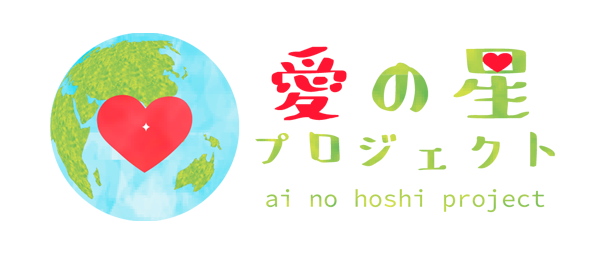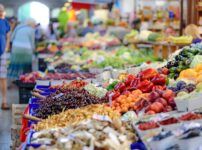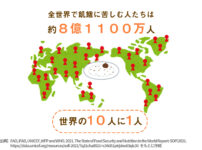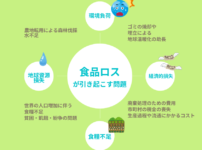5,Share the Earth's resources!
We live on a single planet called Earth. Humanity's competitive mindset and sense of self-ownership have caused a wide range of problems on a global scale, including food problems, poverty, energy resource problems, animal welfare problems, and wars.
The Earth's resources are the very life and life of the Earth. In order for everyone to live equally and happily, we need to start living a life of love, sharing rather than owning, and living with the earth in harmony with people, animals, and nature. Make the choice of love in your daily life!
Let's learn about food loss
Efforts in Japan and around the world
Various efforts are being made in Japan and other countries around the world to reduce food loss around the world. Each of us, as consumers, should be concerned about food loss and make choices to improve food loss with an eye to the global food problem, which will lead to changing the cycle of mass production and mass consumption and to changing the world food distribution system. Food Distribution in Japan In the Japanese food distribution industry, there is a business practice known as the “one-third rule. The figure below illustrates the one-third rule when the best-before date is set at 6 months. The rule states that one-third of the total number of days from the date of manufacture to the expiration date is the delivery deadline (two months from manufacture in the case of a six-month expiration date), and the number of days elapsed up to two-thirds is the sales deadline (four months from manufacture in the case of a six-month expiration date). Under the rules set by food manufacturers, wholesalers, and retailers, food products can be displayed in stores with a certain amount of time left before the expiration date, allowing fresh food to be delivered to consumers. However, if a product is returned even one day after the delivery or sales deadline, it is returned to the store, and much of it is discarded, resulting in a large amount of food loss. Overseas, it is said that “one-half” in the U.S. and “two-thirds” in Europe are common*1 for delivery ...
Food, an essential part of human life, is a major theme in the SDGs. Food loss is closely related to global food and hunger issues. World Hunger Issues The State of Food Security and Nutrition in the World Report (SOFI) published in July 2021 by five UN agencies (FAO, IFAD, UNICEF, WFP, WHO) The State of Food Security and Nutrition in the World Report (SOFI), published by UNICEF, WFP, and WHO, estimates that up to 811 million people worldwide suffer from hunger. This is a sharp increase from the 2019 data and is believed to be due to the impact of the new coronavirus infection (COVID-19). *1[Source] FAO, IFAD, UNICEF, WFP and WHO. 2021. “The State of Food Security and Nutrition in the World Report: SOFI” https://data.unicef .org/resources/sofi-2021/?q31cha8921=c34d51ptrjdeo03qlc30 Is there a shortage of food in the world? Up to 811 million people are without enough food to eat, but this does not mean that there is not enough food in the world. The world's annual grain consumption in 2020 is 2.74 billion tons*2, and if the world's grain were distributed equally among the world's population of 7.875 billion (as of April 2021)*3, 2.7 billion tons / 7.8 billion people = 346 kg (the amount of grain each person can consume per year). The standard amount of grain consumed per person per year is estimated to be about 180 kg, which, when combined with inventories and the production of food other than grain, means that there is enough food to go around ...
Many of you may think that you have been hearing the terms “food loss” and “food loss” a lot lately. Currently, Japan and the rest of the world are facing a variety of problems caused by food loss. There is a growing international movement to reduce food loss. What is food loss! What is “food loss” anyway? It refers to food that is thrown away even though it can still be eaten. It does not include originally inedible parts (such as bones and seeds of fish). In Japanese, the term “food loss” or “food loss” is used. In the Food and Agriculture Organization of the United Nations (FAO), food loss: Refers to a decrease in the quantity or quality of food due to decisions and actions by food suppliers in the chain, excluding retailers, foodservice providers, and consumers food waste: Refers to a decrease in the quantity or quality of food due to decisions and actions by retailers, foodservice providers, and consumers *1*2 [Source] @FAO “Technology Platform for Measuring and Reducing Food Loss and Waste” http://www.fao.org/platform-food-loss-waste/en/ The definition of “food loss” is as follows. In Japan, the term “food loss” is often used, but the English term “food loss” does not include food service providers and consumers, and the meaning of the Japanese term “food loss” is slightly different. Food loss in general is often described as “food loss and waste” in English. Problems Caused by Food Loss Food loss is not only the cause of food shortages, but is ...




